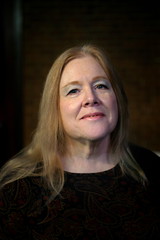Boston snubbed by 365Days/365Plays?
I read the NYer article. There was nothing in it to help me understand why staging 365 first draft fragments all over the country is a good idea, no matter how talented the writer. Not that first drafts and fragments aren't interesting-- I've heard 100s, probably 1000s, at Playwrights Platform and Write On and in
individual readings with colleagues. There we come together for a purpose: to help the writer discover what moves us-the-audience so that s/he can re-shape an individual vision so that it speaks to and for a community. I suppose that a coming together of theatres all over the US in a single project has value as bonding for the
participants, and it is a publicity "hook" for the theatres involved. But there is not much in anything I've read so far that supplies a compelling reason for doing these particular pieces at this moment in time-- and nothing at all to suggest that they are "necessary" to Boston in particular. Getting "on that list" would
only confirm position of Boston as a lagging follower of NYC trend-setters.
In the NYer Als calls Parks "that rarest of birds, the black female
playwright". But they aren't that rare: of the 1930-40 cohort
immediately before my own, plays by Childress, Hansbery, and Kennedy
have entered the repertoire: I have seen a play by each within the
last 5 years. I have not seen any recent productions of plays by
white American women born between 1930 and 1940-- though some of that
generation are still alive and still writing. There were 4000 women
writing plays in America in 1900-1930: the America into which
Childress, Hansbery, and Kennedy were born. Almost all those plays and
writers have disappeared, but they left a legacy which the civil rights movement of the 50's and 60's empowered women of color to claim on behalf of silenced people.
We have talent HERE! How about organizing a city-wide festival for
our quintuple threat actor-director-playwright-producer-teacher
Jacqui Parker???
Labels: 365Days/365Plays, Jacqui Parker, Susan Lori Parks

